A Cloud in Love
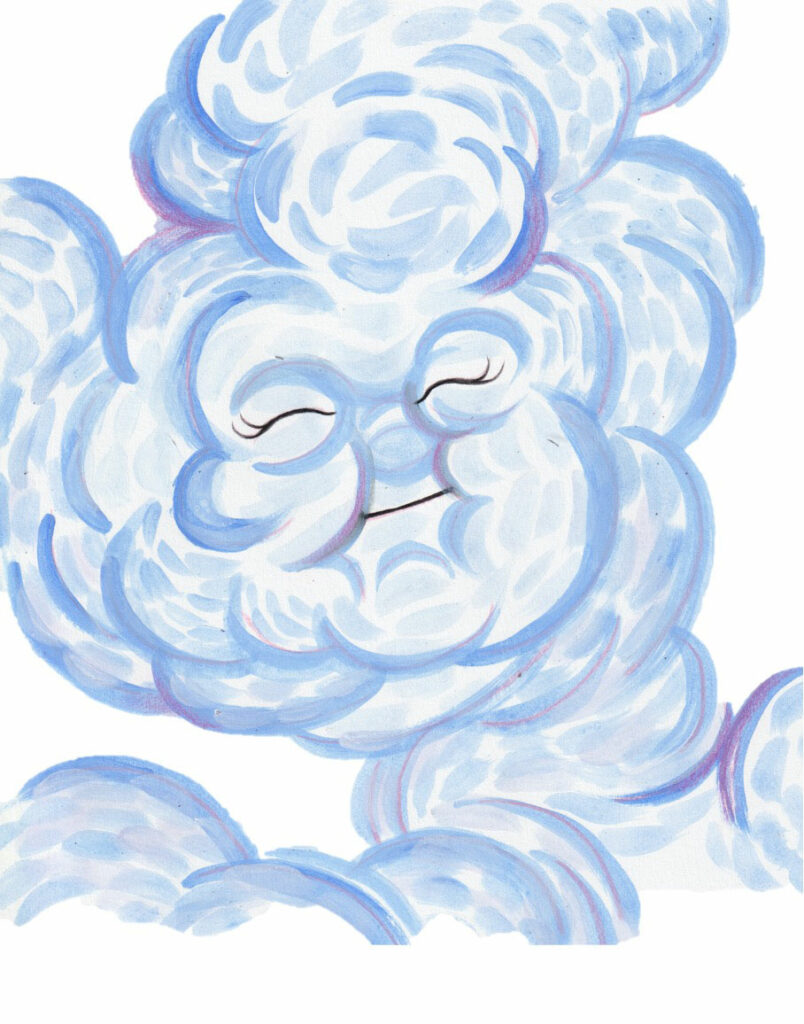
Nazım Hikmet
A Cloud in Love[1]
English translation by Evrim Emir-Sayers[2]
Illustrations by Ambar Velasco
Listen to the PICT audiobook here
“Literature, in all its forms, begins and ends with the fairy tale.” – Nazım Hikmet
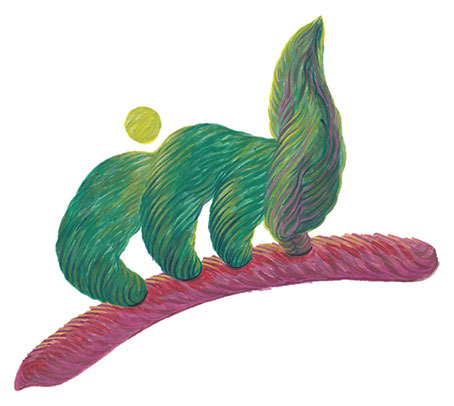
The dervish sat down beneath the cypress tree. He took his ney[3] from his belt and started to play. Through the holes of the ney, trees tossed up in the air. It seemed as if the trees were inside the flute and popped out whenever the dervish blew. Through the holes of the ney, mountains, rivers, roads tossed up in the air. The trees, mountains, rivers, roads that popped out the holes of the ney dropped onto the other side of the world, in a desert without any mountains, rivers, roads, or trees.
The dervish drew a breath. Then he played his ney again. From one of the holes of the ney, a man with a black beard, beaky nose, and bulging eyes tossed up in the air, made two somersaults in the air, and dropped down next to the dervish. The man’s name was Seyfi, Shady Seyfi. Shady Seyfi looked to his right and his left. He slipped his hand in the dervish’s pocket, stole his money pouch, and started to run. The dervish took a stone from the ground, drew a bead on Shady Seyfi, and threw. The stone hit Shady Seyfi so hard that he bounced like a rubber ball. He bounced so high that he was tossed up in the sky. He flew across the sky to the other side of the world and dropped on top of a mountain in the Land of Ney. Or rather, he dropped on the silver-clad saddle of a white horse standing by the mountain.
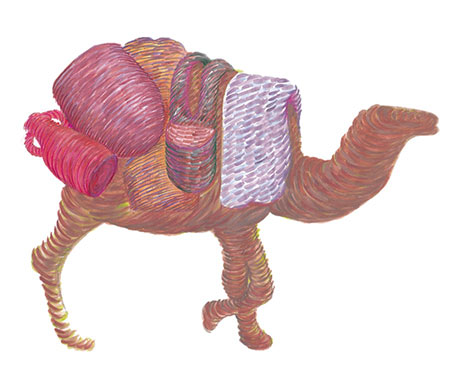
Settling into the saddle, Shady Seyfi scanned his surroundings. Flocks of sheep were coming down from the mountain to the plain. All these flocks were his. On the opposite plain, colored carthorses grazed with lion’s manes. All these horses were his. Below him, camel caravans passed, caravans filled with herbs, silks, coffee, ivories. All these caravans were his. Skirting the plain were fields of wheat, rye, cotton as far as the eye could see. All these fields were his. Long story short, Shady Seyfi was the richest man in the Land of Ney. Shady Seyfi scanned his surroundings from the mountain peak on top of his white horse. His bulging eyes gleamed with greed, and his black, bushy beard bristled.
Let’s leave Shady Seyfi here and return beside the dervish. From one of the holes of the ney the dervish played beneath the cypress tree, a girl popped up in the air, then slowly dropped to the ground right next to the dervish. She was as pretty as the world. Her golden hair reached all the way to her ankles. Her face was a piece of the moon. The charcoal lashes on her hazel eyes were ever so curvy and long. The girl was just fifteen, and Ayşe[4] was her name. Ayşe took the hand of papa dervish and gave it a kiss. She stood before him in respect. “Command me, papa dervish,” she said, “if there is something that you need done, let me do it for you. If your belly rumbles, let me cook tarhana soup[5] for you. If you’re feeling sleepy, let me spread a sheet for you.”
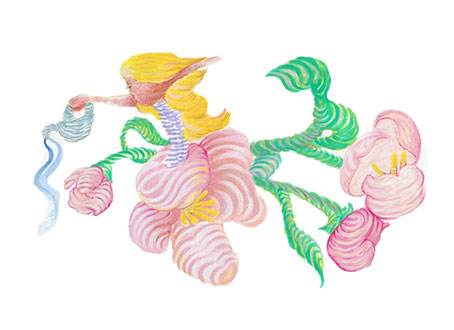
The dervish smiled. “Thank you, Ayşekins,” he said, “My belly isn’t rumbling, and I’m not sleepy either.” Saying this, he rubbed Ayşe’s shoulder. Ayşe rose up into the air, trembling like a feather. Tremblingly, delicately, she flew through the sky. She landed on the other side of the world, in the Land of Ney, on the blooming branch of an apple tree. Were the blossoms more pretty or Ayşekins? If you ask me, Ayşekins was prettier than the blossoms. Ayşekins nestled into the branch and surveyed her surroundings from among the blossoms. The apple tree was in a garden. This garden was Ayşekins’. The roses were in bloom; red, yellow, white roses, roses of fire, apricot roses. The tulips were blooming in all shapes and sizes; the carnations were blooming in folds. Ayşekins climbed down the branch of the apple tree, picked up a watering can, and started to water the flowers.
Shady Seyfi galloped his horse to the gate of Ayşekins’ garden. Around the garden was a fence. Without getting off his horse, Seyfi hollered over the fence: “Ayşe! Hey, Ayşe!”
Ayşekins put down the watering can and turned to Shady Seyfi. “You again?” she asked.
Shady Seyfi made his voice even deeper. “Yes, it’s me again,” he said, “and I’ll keep coming back every day until you sell me this garden of yours—may it dry to dust.”
Ayşekins answered with her sweeter-than-birdsong voice. “How often must I tell you?” she said. “I won’t sell my garden, to you or anyone else.”
Shady Seyfi struck the fence with his silver-handled whip. “Everything in this land is mine,” he yelled, “everything but your garden! This garden—may it dry to dust—sits amidst my property like a black thorn! One way or another, I will tear out its roots—may it dry…”
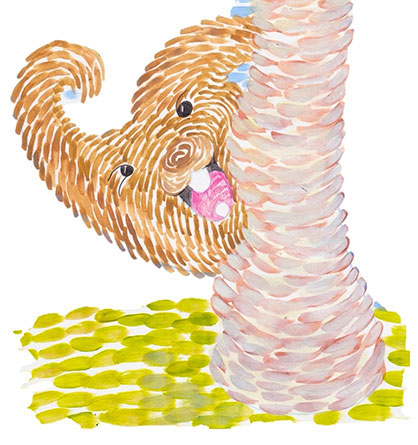
Shady Seyfi couldn’t finish—his horse neighed, gave a kick, and Shady Seyfi rolled to the ground. How did this happen, you ask? Well, let me tell you: while Shady Seyfi sat on his horse on the road outside the fence and talked to Ayşekins in her garden, a rabbit passing by bit the horse’s left back hoof. He[6] bit it so hard the animal neighed and kicked in pain, sending Shady Seyfi to the ground.
But I need to tell you another thing that happened at the same time: As Seyfi wallowed in the dust and cried out in pain, and the terrified rabbit fled the scene, a white dove flew out of Ayşekins’ garden. The white dove flew on top of Shady Seyfi, took aim, and took a dump right in between his two eyebrows. Shady Seyfi got so mad that he forgot about his pain and jumped to his feet. He placed an arrow in his bow and aimed it at the dove. When Ayşekins saw this, she cried out, and the dove escaped in a flurry. And when the white dove escaped in a flurry, Shady Seyfi got back on his horse and started cloppidy-clopping, cloppidy-clopping, galloping after the bird.
While Shady Seyfi chases the bird, let’s return beside the dervish. The dervish was leaning against the cypress tree and playing his ney. A cloud popped out from one of the holes of the ney. The dervish blew on his ney, the cloud rose higher and higher, and moved as slow as a grazing lamb in the meadow of the sky, to the other side of the world, to the Land of Ney.
When the cloud crossed the border to the Land of Ney, he saw, in a field below, the rabbit cleaning his whiskers among the grains. This was the rabbit that bit the left back hoof of Shady Seyfi’s horse. The rabbit, for his part, lifted his head and saw the cloud. The cloud was so amused by the way the rabbit cleaned his whiskers that he started to laugh. The rabbit didn’t understand why or wherefore the cloud was laughing, but since this was the first time he saw a laughing cloud, he found it both strange and amusing himself.
Long story short, as the cloud and the rabbit made friends in this way, Shady Seyfi halted his horse on a hill and scanned the sky for the dove that took a dump in between his two eyebrows. He saw the dove. But right then, the cloud came up to the dove as well. The cloud that came up to the dove looked down and frowned. Shady Seyfi had drawn his bow and aimed it at the dove. The cloud dropped down onto Seyfi and wrapped himself around him. As the smoke poured down his head, Shady Seyfi didn’t know what to do, his eyes couldn’t see, he started to cough and sneeze. The dove, of course, didn’t wait around but escaped.
The cloud was happy the dove was saved, he let go of Shady Seyfi, gathered himself, flew up to the sky, and went back on his way. The cloud roamed far and wide, up the hills and down the vales, and arrived above Ayşekins’ garden. Ayşekins was lying among the tulips and looking up at the sky. To her right sat the rabbit and on her left shoulder perched the white dove that had just escaped Shady Seyfi’s clutches. Ayşekins’ hazel eyes were filled with sunlight. Her golden hair sparkled. With one hand, she played with the long ears of the rabbit to her right, and with the other, she petted the dove on her left shoulder.
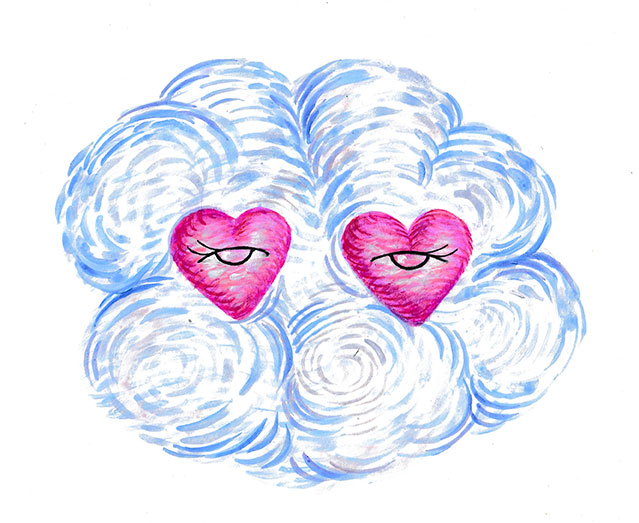
This was the moment the cloud appeared above the garden. A shadow fell upon the garden, but didn’t linger long, and all was light again. Then, the shadow that just fell upon the garden from left to right, fell back upon it again from right to left. As you can imagine, the cloud passed over the garden from left to right, and then, when it looked back and saw Ayşekins, it came right back above the garden once again. Ayşekins saw the cloud as well. The rabbit saw the cloud, and recognized it as well. The dove saw the cloud as well, and when she realized this was the cloud that saved her, she flapped her wings a little. But if you ask about the cloud, he was not in a state to notice either rabbit or dove. That is because, whether you’re human, animal, or cloud, once you see Ayşekins, your eyes see nothing else. The cloud sighed. “Of!” he said, and then a deep “Ah!” Ayşekins blew him a kiss off the tip of her fingers. When Ayşekins’ kiss reached the cloud, he was a little shaken at first. But then he pulled himself together and took the shape of a gigantic rose. As long as the sky had been the sky, never had there bloomed on its blue atlas a white rose as big and beautiful as this. As Ayşekins marvelled at this white rose, the cloud stirred again, spread himself out, pulled himself back together, and took the shape of the heart, that is, became a cloud again.
Long story short, from that day onward, the cloud never left Ayşekins’ side. Wherever Ayşekins went, the cloud went with her. Let’s say Ayşekins digs up the garden with the white dove on her left shoulder and the rabbit to her right, well, the cloud watches over her from above. When Ayşe mops her brow and puts her hand above her eyes to look at the sky, the cloud moves in front of the sun right away, covers it, and the garden is shaded. When Ayşe rests but thinks to herself, “it’s nice to rest in the shade, but the flowers need the sun,” the cloud takes the shape of a Chinese umbrella so the whole garden except for Ayşe bathes in the sunlight.
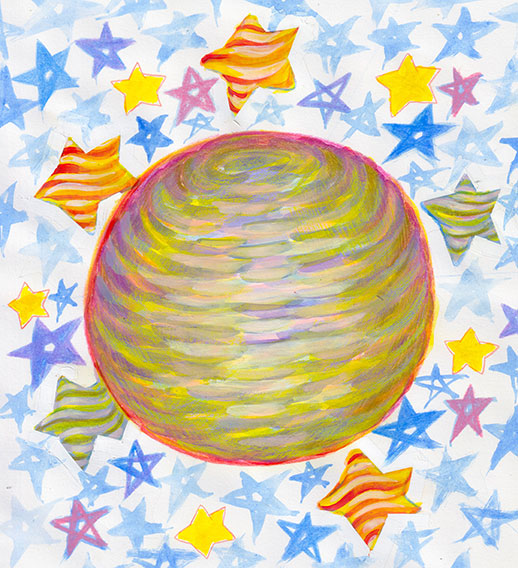
One night, Ayşekins sat in the garden, beside the fountain, in front of her tiny little house. The dove on her left shoulder and the rabbit by her knee were asleep. In the sky, there were the stars, a sickle-shaped moon, and, in a corner, the cloud. Ayşe watched them in the waters of the fountain. The waters of the fountain were like a mirror, but the stars and the moon only sparkled dimly in it. Ayşe raised her head to the sky, only to see that the stars and the moon also sparkled dimly up there. Ayşekins wondered why. What happened to them? Why aren’t they shining bright? As always, the cloud understood what was going through Ayşe’s head. He called down to Ayşe from the corner where he stood. “They’re just a little dusty,” he said, “let me clean and polish them right away!” As soon as the cloud said these words, he took the shape of a gigantic dust cloth and dropped into the fountain. He soaked himself in the water, went back up into the sky, started with the moon, and finished with the stars. He wiped them and he rubbed them until they were all polished and clean. For as long as the stars had been the stars, and the moon had been the moon, they had never shone so bright. Ayşe was delighted. “Thank you, my darling cloud,” she said. Then she got up and went inside. She was sleepy. The cloud came down from the sky and stood by her door. Ayşekins got into bed. The cloud by the door took the shape of a saz, came up to Ayşe’s bedroom window, and started to sing a lullaby.
Sleep, my matchless beauty, sleep
From gardens I brought you this sleep so deep
The leaves in your hazel eyes so green
Sleep, my matchless beauty, sleep
Sleep so sound and sweet
Ninni…[7]
Sleep, my matchless beauty, sleep
From the stars I brought you this sleep so deep
From the velvet of the darkest blue
Sleep, my matchless beauty, sleep
My heart will watch over you
Ninni…
While the cloud took the shape of a saz and sang this lullaby by Ayşe’s bedroom window like he did every night, Shady Seyfi tiptoed into the garden. A huge knife in his hand, Shady Seyfi looked to his right and his left—people who want to do bad things always look like this to their right and their left—then started to cut down the flowers in the garden with his knife. Every flower, let it be rose, tulip, or carnation, let out an “Ah!” as he was cut down and fell to the dark ground, but since they were flowers, they sighed their “Ah!” so gently that none but themselves could hear it.
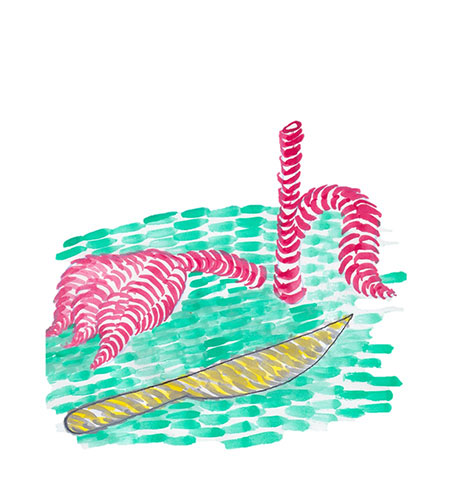
Long story short, Shady Seyfi’s knife came to rest against a thistle’s neck. The thistle started to talk. “Spare me,” he cried, “I might be of help to you one day.” And so, Shady Seyfi didn’t cut him down; not because he pitied the thistle, but because he thought he might use him one day.
In the meantime, since Ayşekins had fallen sound asleep to the lullaby of the cloud who took the shape of a saz and sang to her, the cloud took on his old shape, that is, the shape of a cloud, and went up into the sky. He meant to take a quick look around before coming back and standing guard by the door. He looked ahead, he looked behind, he looked left and right. The mountains and the rocks, the wolves and the birds were all sound asleep. Really, the cloud was sleepy too, but he opened his eyes for one last look at the garden from above, and then he saw Shady Seyfi. He saw that the rascal was cutting down the flowers, and the cloud went mad. “You sneak!” he yelled, quickly took the shape of a hand, and grabbed the handle of the moon right beside it—we said before that the moon was shaped like a sickle. No sooner had the cloud grabbed the handle of the moon than he descended, pricked the tip of the moon-sickle into Shady Seyfi’s şalvar,[8] and through his şalvar right into his buttocks. Shady Seyfi was stupefied—you’d have been stupefied too. He whirled around and tried to fight the cloud-hand and the moon-sickle with his knife. But as soon as the knife touched the edge of the moon-sickle, it smashed to smithereens as if it were made of glass. The cloud let go of the moon’s handle and went back up into the sky. And while the moon stayed down and fought Shady Seyfi one-to-one, the cloud started to pluck the stars from the sky and throw them at Shady Seyfi’s head. The moon-sickle on the ground, a bombardment of stars from the sky—who could resist such an assault? Shady Seyfi took to his heel and ran out of the garden like a dog with a tin tied to his tail.
The next morning, as Ayşekins weeded the garden, she came across the thistle. “I mean you no harm or offense, thistle,” she said, “but there’s no room for you in my garden. Either you leave of your own free will, or I will tear and throw you out.” “I won’t budge an inch of my own free will,” the thistle said. “Tear me out if you can.” Ayşe didn’t get mad at the thistle’s reply. She dug out the thorn by his root with her hoe, held him up by one end, and threw the weed over the fence. The thistle that landed beyond the fence turned into a snake and started to slither away down the dusty road.
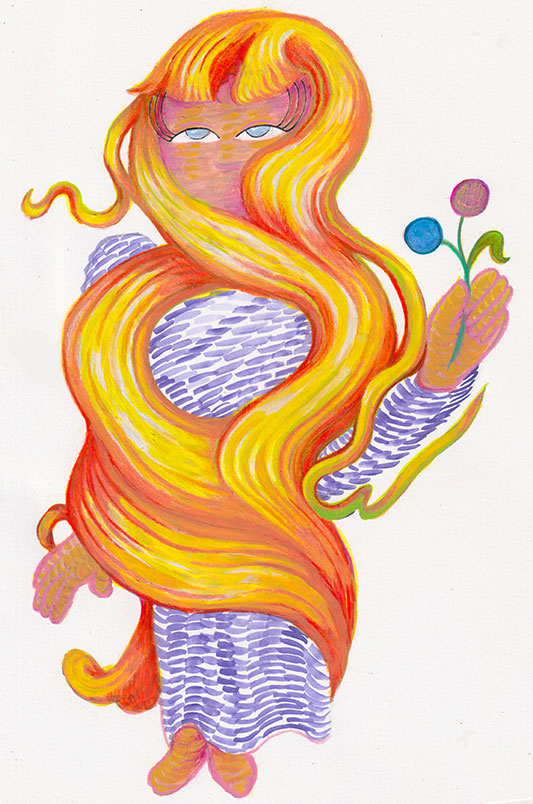
While the thistle slithered away down the dusty road, time went by, evening came, and it got dark. Shady Seyfi came back on his horse and stood by Ayşekins’ garden’s gate. With his pipe-like voice, he started to talk to Ayşekins. “Ayşe,” he said, “I’m the wealthiest man in the world, come marry me.” From the garden, Ayşe replied: “You want my garden, not me. I would rather turn to stone than marry you.” Shady Seyfi got mad and got up on the silver-embossed saddle to jump into the garden. But the cloud, who watched all this from above, quickly took the shape of a horrible ghost, dove down onto Shady Seyfi, and attacked him. Shady Seyfi got so scared that he almost swallowed his tongue. He galloped away on his horse. The cloud-ghost chased Shady Seyfi all the way across the river. Then he came back, went into the garden, took the shape of a hairy shepherd’s dog, and lay down at Ayşe’s feet. Ayşe petted the cloud. “Thank you, my darling cloud,” she said. The cloud let out such a tender bark and wagged his tail so gently that you wouldn’t have expected it from a shepherd’s dog.
While Ayşekins and the cloud enjoy each other’s company, let’s turn to Shady Seyfi. On the other side of the river, where Seyfi stopped his horse, he came across the thistle. “Hello, Seyfi Ağa,”[9] he said, “I see that Ayşekins chased both of us away. Take me on your back and lead your horse to where I tell you.” Shady Seyfi took the thistle on his back and led his horse to where he told him. They roamed far and wide, up the hills and down the vales. The thistle made Shady Seyfi buy a sack and a jar. He hung the jar to the right and the sack to the left of the horse.
And again, they roamed far and wide, up the hills and down the vales, and again, they passed through forests and heaths. They rode so far without a rest that Shady Seyfi’s horse got thin, as thin as skin and bones. On the fifteenth day, they crossed a field that stretched as far as the eye could see. On the thirtieth day, they found themselves surrounded by rocks on all sides. The weather was hot as in hell. The earth was scorched and cracked. Shady Seyfi looked around, but there wasn’t an inch of shade. On the thirty-fifth day, there was no more trace of either rocks or earth. Only sand stretched under the moonlight, from one dawn to the next, until the horse couldn’t take another step. On the fortieth day, the thistle said, “We’re here. This is Dry Country. Fill the sack with sand.” Shady Seyfi got down from his horse that had turned into skin and bones, and filled the sack with the sands of Dry Country. Then he loaded the sack on the beast and got on himself. The horse started to talk: “Pity me, Seyfi Ağa,” she said, “I’m too tired to even trot, how can I shoulder this sack of sand?” But rather than pity the horse, Shady Seyfi whipped her. Stumblingly, the white horse soldiered on.
“Now,” the thistle said, “we go to the Land of Winds.” They roamed far and wide, up the hills and down the vales. Suddenly, a wind started blowing in their faces, a wind so strong they couldn’t take another step. Trees appeared, their roots seven levels under the earth, their crowns seven levels up in the sky. Their crowns, seven levels up in the sky, bowed all the way down to the earth with trembling branches and leaves, and then rose up again. “I can’t go any farther,” Shady Seyfi said. “My horse has no more strength, and I no more endurance, against this wind.” “We can’t stop,” the thistle replied. “Spur on the horse.” And so, Shady Seyfi rode for three more days and three more nights, whipping his white horse until she sweat blood and baring his chest to the wind. Finally, they arrived at a shore. The waves on the sea were all foam, and the foam rose up to the sky, one wave on top of another, till it was seven minarets tall, and then it crashed onto the shore, right onto the bleeding waters, with an enormous noise like a crack of doom. “We’re here,” the thistle said. “Fill the jar with wind.” Shady Seyfi held the mouth of the jar to the wind. Howling and roaring, the wind filled the jar. Quickly, Seyfi covered the mouth of the jar with a piece of leather, and then, using the thistle as rope, tightly tied the leather to the mouth of the jar. He loaded the jar onto the horse as well. Then he set off again, back to where he’d come from. And since the wind was in their backs this time, the horse rode off as if she’d grown wings.
While Seyfi rides before the wind like this, let’s return beside Ayşekins. Ayşe was in bed, the dove by her head, the rabbit by her feet, the cloud outside the window, all sound asleep. Shady Seyfi, who travelled the road of forty-three days back in a mere three, arrived before Ayşekins’ garden. He got off the horse and shouldered the sack. Into the garden he went. He sprinkled the sand of Dry Country all around the garden, on the roses, carnations, tulips, and trees, and then got out again.
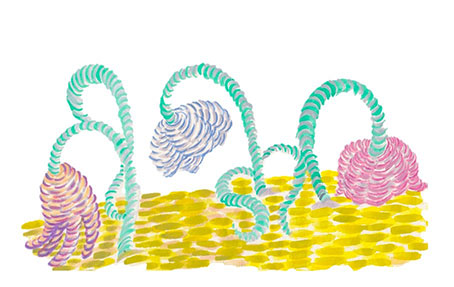
Long story short, morning came, and Ayşekins, the dove by her head, the rabbit by her feet, and the cloud outside the window woke up to an unbearable moan. They ran into the garden, and what should they see? The tulips, roses, carnations, and trees, even the water in the fountain, were drying out with a moan. The flowers were turning pale, the leaves were curling up as if touched by fire, and the water in the fountain was running dry as if a hole had been punched in the basin. With one voice, they all moaned. “Save us, Ayşekins,” they cried, “we’re paling and wilting away, we’re drying out and dying! Save us, Ayşekins!” Ayşekins didn’t know what to do. Like mad, she started running from bending rose to wilting tulip, from wilting tulip to drying carnation. Meanwhile, Shady Seyfi sat on his horse on the road outside the fence, scratching his black beard with his black nails and grinning with glee. Once even the last flower in the garden had dropped to the dry earth, Shady Seyfi cried: “Sell me your garden, Ayşekins! It’s no longer a garden but a graveyard anyway! Sell me the garden and scram wherever you want!” But this is how Ayşekins answered: “I won’t go anywhere!” she said. “I’d rather be buried in this graveyard, next to my dead flowers!”
While Ayşekins and Shady Seyfi went back and forth like this, the cloud went up to its place in the sky and watched the scene from above. He felt so sad he couldn’t open his mouth or lift a limb. The dove flew up beside the cloud. “Brother cloud,” she said, “brother cloud, why don’t you help Ayşekins?” The cloud let out a deep “Ah!” “What can I do?” he answered, “how can I help? I would lay down my life for Ayşekins.” “Well, then,” the dove said, “since you would lay down your life for Ayşekins, then go ahead and lay down your life!” “Of course,” the cloud said, “why didn’t I think of that?” And right away, he started laying down his life for Ayşekins, raining down as rain. When Shady Seyfi saw this, he got so mad that he started shooting arrows at the cloud. But the thistle yelled from the mouth of the jar: “Do you really think arrows can pierce a cloud? Untie me! Open the mouth of the jar!” No sooner had the thistle spoken than Shady Seyfi opened the mouth of the jar, unleashing the wind in the jar into the sky, onto the cloud. Ayşekins cried out from below: “Watch out, my darling cloud!” The cloud took the shape of a heart. When the wild wind hit the heart, he smashed it into a thousand parts, so the heart became a thousand heartlings. Shady Seyfi yelled at the wind from below. “Tear the cloud apart,” he cried. ‘Show him no pity!” The rabbit cried at the cloud from below: “Hang in there, brother cloud!” The thousand heartlings wrestled the wind, trying to reunite. The white dove pecked up the heartlings that had blown far away and carried them back, helping them to gather. Ayşekins, the rabbit, Shady Seyfi, the white horse, and the thistle all watched the fight in the sky, some cheering on the cloud and the dove, others the wild wind.
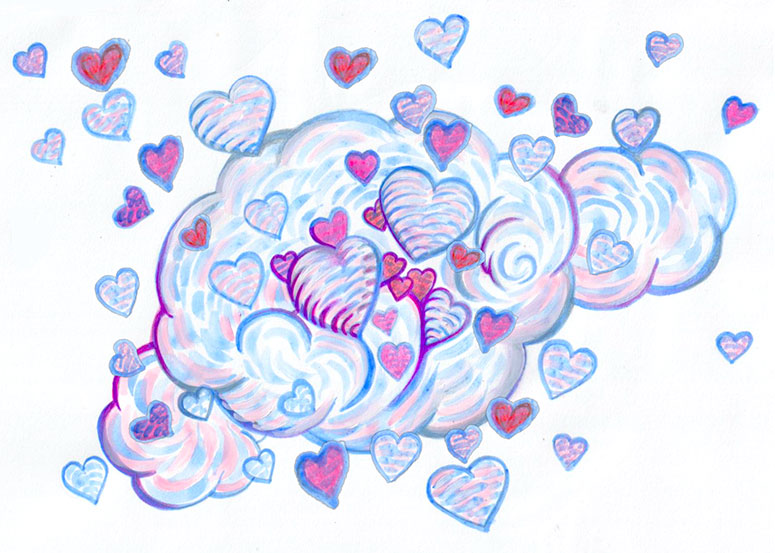
Long story short, all the heartlings gathered into one big heart again. When the thistle saw this, he cried out to Shady Seyfi: “Throw me up!” Seyfi threw the thistle up in the sky. The thistle slung himself around the heart-shaped cloud and started to suck out his blood. At the same time, the wild wind tried to tear the cloud apart again. Quickly, the white dove pecked at the thistle and started to pick it to pieces. Piece by piece, the thistle dropped to the ground, right by Seyfi’s feet. Shady Seyfi was beside himself with rage. Ayşekins and the rabbit were beside themselves with joy.
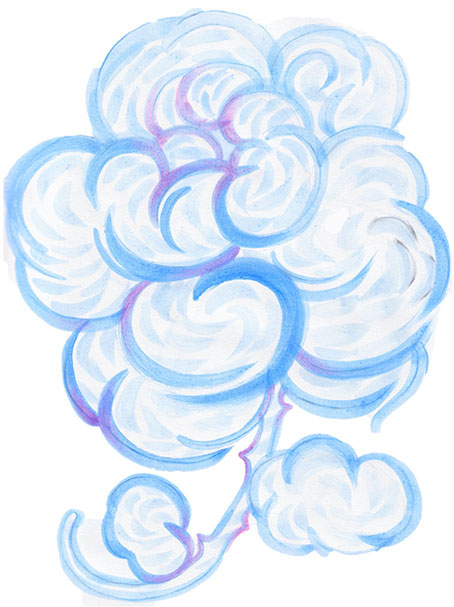
Once the wild wind was gone for good, the cloud took the shape of an eye in the sky and started to cry. The white dove asked the cloud: “Why do you cry, brother cloud? Is it that you pity yourself?” “It’s not that I pity myself,” the cloud replied, “I would lay down my life for Ayşekins. But I have to leave her side, and that’s why I cry.” The cloud turned into a rain that came down in sheets. The flowers in the garden raised their heads, started to breathe, and their colors returned to them. As for Ayşekins, she wiped away her tears and cried to the sky: “My darling cloud, my darling cloud, don’t die, I don’t want it, it’s enough… Don’t die!” And Shady Seyfi stood soaking wet under the roaring rain, gritting his teeth both out of rage and the rain that soaked him to the bone.
But let’s leave the cloud, Ayşe, and Shady Seyfi for the moment and see where the white dove went. The white dove flew after the wild wind who blew away in shame at his defeat. She caught up with him on a mountaintop. “Brother wind,” she said, “Shady Seyfi shamed you by trying to use your power and force for a wrongful cause. That’s why you couldn’t handle a single cloud. Won’t you avenge yourself? Won’t you call Shady Seyfi to account?” As soon as the wild wind heard the white dove’s words, he turned back, all whistling and stirring up dust, and threw himself at Shady Seyfi. He grabbed him from on top of the horse, hurled him up in the air, tossed him back and forth, and smashed him to the ground. Seyfi tried to get back on his horse, but the white horse said: “When did you ever pity me that I should I pity you now?” and kicked Seyfi off again. Seyfi fell to the ground. This time, the wild wind swept him up like an autumn leaf, blew him on and on, and dropped him off the edge of a cliff.
While Shady Seyfi hurtles down the cliff, let’s return to Ayşekins’ garden. All the flowers glistened, all the trees were back in bloom. Ayşekins stood by the fountain, the dove on her left shoulder, the rabbit by her right foot. The sky was blue once again, the sun was bright. Everyone smiled except Ayşekins. “Why do you grieve, my Ayşe?” the white dove asked Ayşekins. “My darling cloud saved my flowers, me, and all of us,” Ayşekins said, “but he himself was lost. He laid down his life for us all. Who should grieve if not me?” Ayşekins let out a deep sigh, and from her hazel eyes, tears dropped like pearls into the waters of the fountain. “Don’t grieve in vain, Ayşekins,” said the rabbit, “good people, good animals, and good clouds are never lost. Those who love, live. Just take a look at the fountain!” And what should Ayşekins see? From the waters of the fountain, which was full to the brim with the rain that fell a moment ago, a blue steam rose up under the golden rays of the sun.
Long story short, before much time had passed, the cloud started to form again up in the blue sky, and once he fully took back his old shape, he looked from above at Ayşekins and the garden, turned into a huge mouth, spread himself out, and smiled. And so it came that in the Land of Ney, the good were rewarded with good, and the bad got their just desserts. And so the tale the dervish told on his ney came to an end, and so the dervish took his ney under his arm and went.
For all PICT babies and kids.
EVRIM EMIR-SAYERS is a philosophy scholar who researches, teaches, writes, edits, and translates out of Paris, France. She is a co-founder and core faculty member of PICT. Visual artist AMBAR VELASCO is creative assistant at PICT.
evrim@parisinstitute.org; ambar@parisinstitute.org
dePICTions volume 3 (2023): Critical Ecologies

[1] Behind this children’s tale hides a multi-layered text with a multi-layered history. Starting from oral source material compiled by Turkish folklorist Pertev Naili Boratav and his students, it was adapted into its written form by the Turkish communist poet Nazım Hikmet. Due to the poet’s political exile from Turkey in 1951, it was first published in French, in 1955, as part of a compilation entitled Contes Turcs. Russian, Macedonian, and Albanian translations followed, and in 1959, the tale was adapted into an animated short film in the Soviet Union. The Turkish original was first published in Yugoslavia, in 1967, and finally, in 1968, in Turkey itself, where the text had a chequered history: while in 1979, it was reprinted by the Turkish state and distributed to one million schoolchildren free of charge, it was temporarily banned almost immediately after, following the 1980 Turkish coup d’état. Theatre adaptations have been performed in France (1974) and Turkey (1991); most recently, in 2022, the tale was adapted into an opera for children by the Greek National Opera.
[2] Special thanks to David Selim Sayers for his editing suggestions.
[3] A reed flute.
[4] Pronounced Aye-shay.
[5] A soup made out of dried ingredients.
[6] Turkish is a genderless language that uses the gender-neutral third person singular pronoun “o” to cover the English “he,” “she,” and “it.” The gender pronouns used in this translation for the rabbit, the horse, and other non-human characters were chosen arbitrarily.
[7] The Turkish equivalent of “lullaby.”
[8] Traditional baggy trousers.
[9] Lord or master.


Responses